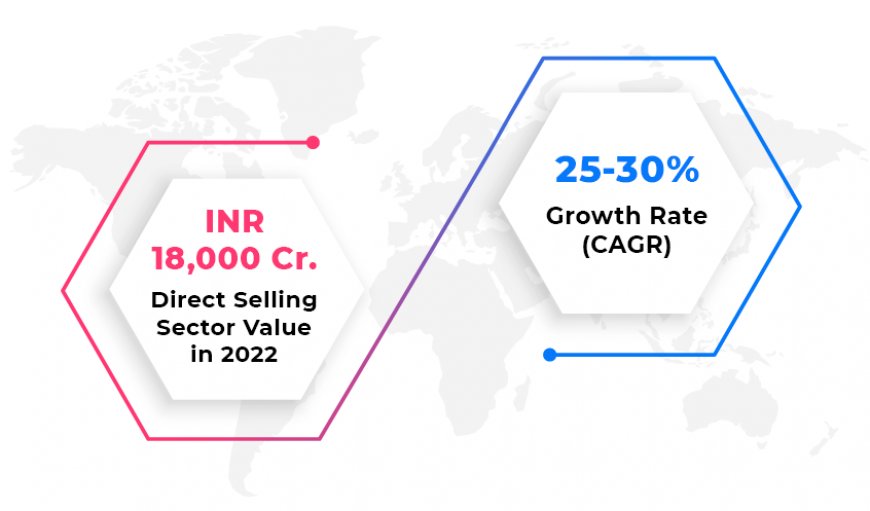The Future of Direct Selling in India 2025: Trends and Forecasts
Discover the evolving trends in India's direct selling industry for 2025, highlighting key developments and opportunities shaping the future.

Direct selling has long been a staple of India's economic environment, providing businesses and customers with a customized, adaptable approach to trade. The future of direct selling in India is bright, given its extensive popularity across a wide range of industries such as wellness, cosmetics, technology, and consumer goods. The sector has developed tremendously over time, and as we approach 2025, it is primed for even larger upheavals.
In this article, we will look at the present situation of the direct selling sector in India, recent changes to direct selling regulations and norms, new trends, and industry projections for 2025 and beyond. We will also discuss the problems that firms may encounter, chances for development, and practical advice for direct selling enterprises to flourish in this changing industry.
An Overview of the Direct Selling Industry in India
Direct selling is a thriving business in India, with significant expansion in recent years. With a growing emphasis on entrepreneurship, a youthful and tech-savvy populace, and a significant move toward e-commerce and home-based enterprises, India provides an ideal environment for direct-selling organizations.

According to the Direct Selling Association of India (DSAI), India's direct selling sector was valued at more than INR 18,000 crore in 2022 and is predicted to develop at a compound annual growth rate (CAGR) of 25-30% in the future years. The increase may be ascribed to the growing number of individuals looking for extra money, the expansion of work-from-home culture, and the thriving e-commerce and social media ecosystems that offer direct sellers with a platform to meet potential clients.
Amway, Herbalife, Oriflame, Tupperware, and a number of local businesses are among the major direct-selling enterprises in India. The industry's expansion is not confined to huge corporations; smaller and developing businesses are also profiting on the increased need for direct selling, frequently employing digital platforms and influencer networks.
Recent Updates to Direct Selling Rules and Guidelines
The Government of India has implemented various rules and regulations throughout the years to guarantee that the direct selling business functions in a transparent, fair, and accountable manner. These direct selling guidelines are intended to protect both buyers and sellers against fraudulent activity, pyramid schemes, and unethical business practices.
These restrictions have been significantly updated in recent years, most notably by the Ministry of Consumer Affairs' Direct Selling Guidelines 2021. The guidelines emphasized:
-
Transparency and Ethics: Direct selling firms must follow ethical business standards, such as upfront product pricing and a clear return policy. Companies must give their sellers with written agreements outlining their rights, duties, and compensation arrangements.
-
Prohibition of Pyramid Schemes: One of the primary goals of the rules is to avoid fraudulent pyramid schemes that exploit individuals under the pretext of direct marketing. The rules clearly describe a pyramid scheme and give a legal foundation for its prohibition.
-
Consumer Protection: The guidelines require corporations to provide clear information about their products and services, including components, usage, and potential dangers. This is intended to safeguard customers from misleading commercials and deceptive marketing activities.
-
Registration and Licensing: Direct selling firms must now register with the Department of Consumer Affairs and follow the authorized legal processes. The standards also require firms to offer extensive information about their operations and pay plans.
The implementation of these rules is viewed as a step toward improving the legitimacy and professionalism of India's direct selling business. Companies that follow these standards are more likely to gain consumer confidence and expand their commercial chances.
Key Trends Shaping the Future of Direct Selling in India 2025
Several factors are influencing the future of direct selling in India and knowing them can help firms remain ahead of the curve. As we approach 2025, here are some significant elements driving the industry's development and evolution:
- Digital Transformation and E-Commerce Integration
The digital revolution has had a significant influence on direct sales in India. The proliferation of smartphones, increased internet penetration, and the advent of social media platforms such as Instagram, Facebook, and YouTube have made it simpler than ever for direct sellers to reach potential clients.By 2025, we should expect even more convergence of direct selling and e-commerce. Companies will use digital platforms, smartphone applications, and online marketplaces to expedite sales processes, reach larger audiences, and create a more seamless purchasing experience. Virtual parties, live-streaming events, and influencer marketing will be critical tools for direct sellers to interact with their target audience and increase sales.
-
Social Selling and Influencer Partnerships
Social selling, or the use of social media platforms to promote a business, will continue to grow in India. Many direct sellers now collaborate with influencers and content creators to increase brand exposure and sales. This tendency is projected to continue, particularly as social media becomes more integrated with e-commerce tools like Instagram Shops and Facebook Marketplace.In the future, influencer marketing in direct selling will evolve beyond endorsements, with influencers becoming active players in the selling process, resulting in more personalized and authentic sales experiences for their audiences.
-
The Rise of Subscription-Based Models
Subscription-based models are gaining popularity across a variety of industries, including direct marketing. Companies selling health, beauty, and lifestyle items are increasingly looking at subscription services that send products to clients on a regular basis.By 2025, subscription-based direct-selling firms will be more common. This strategy provides direct sellers with a consistent, ongoing revenue stream while giving customers with individualized items supplied on a regular basis. The subscription model also promotes consumer loyalty and allows businesses to maintain constant connection with their clients.
-
Personalized Customer Experiences
Consumers are increasingly seeking individualized experiences when purchasing items, and direct selling provides a unique chance to provide precisely that. Direct sellers may engage with clients one-on-one, adjusting product recommendations to specific interests.By 2025, we anticipate direct selling businesses in India to leverage data analytics and AI tools to obtain a better understanding of customer behavior, allowing them to provide even more personalized experiences. Sellers will be able to offer individualized product bundles, recommendations, and marketing messages, increasing consumer happiness and loyalty.
Opportunities For Expansion in the Indian Market
India, with its large population and increasing middle class, presents enormous opportunities for direct selling firms. Here are a few important chances for businesses to capitalize on in the next years.
Expanding Rural Markets: Although direct selling has traditionally been centered in urban areas, there is a large untapped market in rural India. As more rural areas have access to the internet and cellphones, direct selling businesses may reach new clients and develop their networks.
Health and Wellness Products: The health and wellness sector is thriving in India, as people become more health-conscious and aware of the necessity of living a healthy lifestyle. Direct selling enterprises that provide nutritional supplements, fitness items, and organic goods are well positioned for development.
Young Entrepreneurs: With a huge number of young professionals in India, direct selling allows people to create their own enterprises with little investment and flexible working hours. This is anticipated to drive industry development as more people seek alternate job routes.
Predictions For Direct Selling in 2025 and Beyond
Looking ahead to 2025, the future of direct selling in India seems promising. We predict the following trends:
Increased Regulation: With the new direct selling restrictions in place, the government will continue to impose harsher limits to guarantee compliance. Businesses that fail to comply with laws may face penalties or legal action, so it is critical to remain current on the newest rules and guidelines.
More Professionalism: The sector will become more professional as direct selling organizations adhere to ethical norms, transparency, and equitable reward schemes. This will build trust among customers and investors.
Adoption of Technology: Companies will increasingly use automation, artificial intelligence, and digital technologies to simplify operations and improve consumer interaction. Sellers will have access to advanced technologies for inventory management, payment processing, and customer communication.
Challenges Direct Selling Companies Could Face in 2025
Despite the enormous development potential, direct selling enterprises in India will confront the following problems in 2025:
Compliance Issues: With the ever-changing regulatory landscape, businesses must be alert to ensure they are following the most recent norms and laws. Noncompliance might result in substantial fines or the suspension of activities.
Competition from E-commerce Giants: As e-commerce platforms like Amazon and Flipkart gain traction, direct merchants may face strong competition. Large e-commerce corporations have a broad reach, established credibility, and substantial marketing resources, making it more difficult for smaller direct selling businesses to compete.
Keeping Trust and Transparency: The most difficult difficulty for direct selling organizations is keeping consumer trust. Businesses must follow ethical marketing procedures, avoid making false promises, and guarantee that their salespeople are taught to promote items properly.
How Can Direct Selling Businesses Adapt to Regulatory Changes in 2025?
To succeed in the future, direct selling firms must comply with the most recent rules and norms. Here's how.
- Stay updated: Regularly monitor regulatory revisions and adjust corporate procedures accordingly. It is critical to have a legal staff that understands the newest requirements and can advise on compliance.
- Transparency: Make sure that your pay system, product pricing, and agreements are clear and easy to comprehend for both sellers and customers.
- Education and Training: Provide ongoing training to your sales team on the newest rules, ethical selling methods, and product expertise.
Top Trends Set to Dominate Direct Selling in 2025
-
Enhanced digital presence and e-commerce integration.
-
Social selling and influencer-based marketing
-
Subscription-based sales models.
-
Personalized consumer experiences powered by AI
How to Ensure Direct Selling Compliance in 2025
-
Keep a watchful eye on changing regulatory regimes.
-
Promote ethical and transparent corporate practices.
-
Regularly teach your sales and support teams on compliance and ethical requirements.
Perspectives from Industry Leaders
Industry executives predict that 2025 would be a watershed moment for direct selling in India. With changing rules, a more digitized economy, and rising consumer interest, the sector faces both obstacles and possibilities.
Tips for Direct Selling Companies
-
Take a digital-first approach: Use digital platforms and mobile applications for marketing, sales, and consumer involvement.
-
Focus on customer loyalty: Create long-term relationships with clients by offering tailored experiences and subscription models.
-
Comply with all requirements: Stay ahead of the curve by adhering to the most recent direct selling requirements.
In conclusion, the future of direct selling in India 2025 is vibrant, full of potential, and ready for those who are willing to innovate, comply with regulations, and connect meaningfully with their customers. By 2025, direct selling will not only be a more professional, regulated industry but also a dynamic, highly competitive marketplace. Companies that embrace these trends and align themselves with the changing demands of the market will ensure that they remain relevant and successful for years to come. The time for direct selling businesses to prepare for this future is now, and those that rise to the challenge will be well-positioned to lead in this exciting new era of commerce.
What's Your Reaction?



















